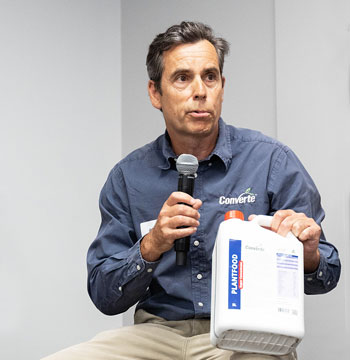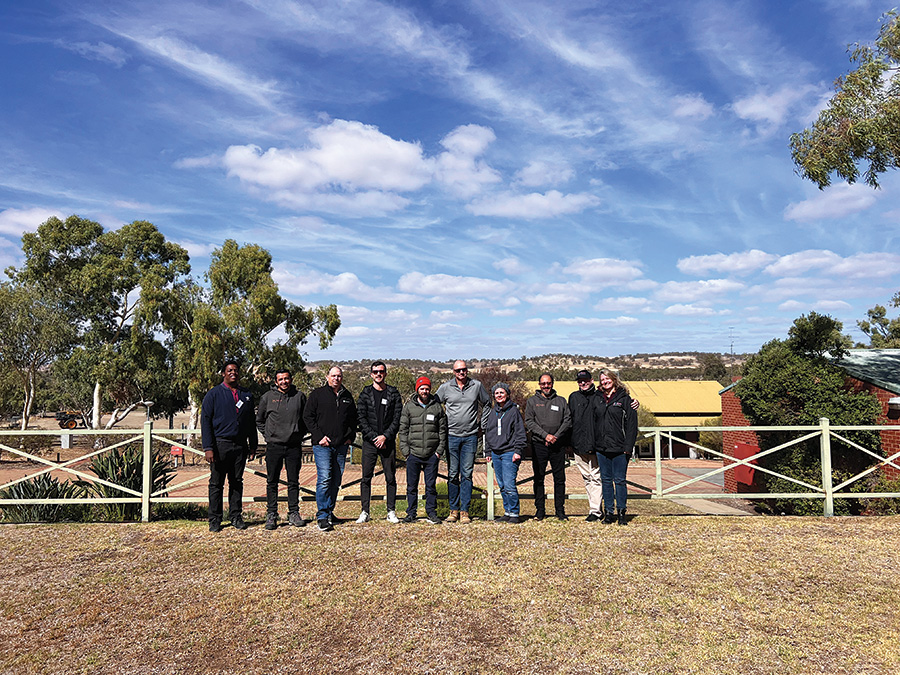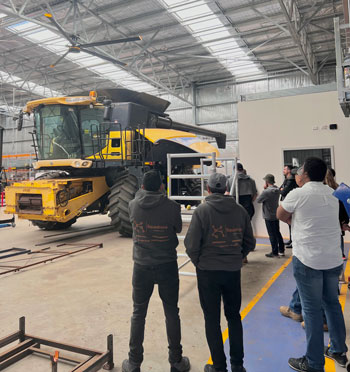Key points
- GRDC is investing $5 million over the next five years in a second Australian Grains Innovation program
- The program sits between the usual research and development GRDC funds and targeted, equity investment through funds such as GrainInnovate
- It offers support earlier in the journey, aiming to bring new technical solutions to market sooner and with a greater chance of success
It reportedly took Thomas Edison thousands of attempts before he succeeded in making a light bulb suitable for domestic use in 1879.
Trial and error was an important part of the American inventor’s process, but so was testing numerous ideas and products.
GRDC has taken a leaf out of Edison’s playbook, investing $5 million over the next five years in a second Australian Grains Innovation program to ensure a pipeline of novel technology and business ideas with the potential to solve some of the grains industry’s trickiest problems.
The program complements GRDC’s long-established research network by targeting non-traditional sources such as innovative growers, agronomists, tertiary students and entrepreneurs, including those from overseas and without a background in agriculture.
Participants in the first round of the program, from 2019 to 2023, included innovators who developed:
- a crimping roller for terminating cover crops without using chemicals;
- a new range of products made from pulse flours;
- technology for producing a concentrate suitable for oat milk;
- sensors for automated grain variety and quality inspection; and
- a digital logbook for managing machinery service records.
The program also supported Melbourne agtech startup AquaTerra, which took part in the Farmers2Founders five-month accelerator program in 2021-22.
Figure 1: The flow, development and filtering of potential innovation opportunities.

Source: GrainInnovate
Cicada Innovations
Cicada Innovations leads the GRDC Grains Challenge. Now in its third year, it aims to tackle critical issues facing grain growers.
Established in Sydney in 2000, Cicada Innovations is an Australian deep tech incubator and has been behind many science and engineering ventures.
Group executive for tech and commercialisation programs Hebbat Manhy says Cicada recognises that innovation can come from anywhere, with many crossovers with health, manufacturing, sensors and robotics.
“We want to help those innovators to pivot into the ag industry, ultimately increasing the value of the grains sector and really helping grain growers meet all their targets.”
Ms Manhy says Cicada’s intensive and practical workshops aim to unpack assumptions, bridging the gap between innovation and on-farm adoption.
This year’s cohort includes Rainstick. Rainstick has adopted ancient First Nations wisdom to further develop and validate variable electric field technology to trigger seeds and fungi to produce at faster and greater volumes tailored to meet market conditions.
Others are More than Machines with an AI solution, eBottli with a grains digital traceability solution, and CLEAN Bioenergy with a solution that turns biomass into bionutrients and energy. “Cicada is a big believer in collaboration,” she says. “It takes a village to support these companies through the long arc of deep tech commercialisation.”
 Converte managing director and co-founder John Ridley explains the yield benefits and return on investment shown by his product, an organic biological fertiliser supplement. Photo: supplied by Cicada
Converte managing director and co-founder John Ridley explains the yield benefits and return on investment shown by his product, an organic biological fertiliser supplement. Photo: supplied by Cicada
Another success story is Converte, which has developed an organic biological fertiliser supplement based on more than 10 years of R&D and hundreds of trials in Australia and India.
“By the time they finished Fast Start, they had been able to demonstrate the efficacy and the return on investment and started to transition their early customers, which were regenerative farmers, into broadacre where they’re doing large-scale trials,” Ms Manhy says.
There is also MPT Ag, which has invented a smart seeder. It uses in-furrow sensors to measure soil moisture and adjusts seed depth and placement seeking to improve germination and even crop emergence.
Ms Manhy says there is huge potential for innovation to benefit the grains industry and GRDC is leading the way by sponsoring these programs.
“We are keen to see more research and development corporations sponsor similar programs because it’s the RDCs that can pull the change in our economy through innovation adoption,” she says.
Farmers2Founders
Farmers2Founders co-founder and executive director Skye Raward says its latest flagship national accelerator program began in April with three grain-focused ‘scaleups’.
They are:
- Field Micro – it has come up with FieldBots, which can be automated for remote monitoring and control of irrigation, humidity and moisture in grain bins, and wind speed and direction for spraying;
- MagrowTec – it is commercialising a magnetic device that can be retrofitted to a spray boom, offering improved drift control and reducing crop protection chemical application rates; and
- Indyn – it has created Platypus Vision, which uses advanced imaging techniques and machine learning to inspect and grade cereal, pulse and oilseed grains.
Ms Raward says the accelerator program includes some elements that are common to all participants but is largely customised to meet their individual needs.
Like its name suggests, an accelerator program helps participants to fast-track up to three key business priorities, she says.
Each priority is different for each business. “They all have very different priorities, which they outline and then the program helps them to accelerate that.
For example, we have an entrepreneur in residence; they get business coaching, we have an interim advisory board, and each business is supported with its own growth roadmap and investment strategy.
As well as accelerator programs, the GRDC five-year investment now underway has been expanded to support a range of pre-accelerator programs. These are open to tertiary students and entrepreneurs in the very early stages of developing innovations, such as the prototype or minimum viable product stage.
Ms Raward says the pre-accelerator program is designed to help founders win their first customers and further validate their technology with end users through business model design and experimentation.
The three grain-focused participants in the current 12-week pre-accelerator program are:
- AgDesk, a platform for managing tasks that simplifies regulatory compliance and optimises resource usage;
- Blue Bee Consulting, which proposes using AI and cameras in the field for real-time insect monitoring; and
- Linttas Electric Company, which aims to develop the world’s first electric combine harvester.
Ms Raward says more than 100 startups have undertaken Farmers2Founders programs in the past five years and industry support has been crucial for addressing the different entrepreneurial journey stages.
“We’re trying to always put producers at the centre of the innovation process, so any startup or founder we work with is connected into the industry and GRDC helps us connect them with the end users – the growers,” she says.
“And that’s critical to ensure the solutions that get developed actually meet the needs of Australian farmers. With agtech being an emerging industry, it’s attracting a lot of new entrants; there’s a lot of technology out there but it needs to solve a real problem to succeed.”
SproutX
As one of the first Australian companies to offer accelerator programs, SproutX has coached more than 100 ‘future founders’ and more than 70 startups along the path to commercialisation in the past seven years.
Program director Maxie Juang, who manages SproutX’s pre-accelerator, accelerator and corporate programs, says their job is to “keep the door open” and ensure a healthy pipeline of innovators becoming export and investment-ready.
As well as grains-focused innovations, the current cohort includes products and services for the livestock, biodiversity, circular economy and alternative protein sectors.
Ms Juang says part of her job is to introduce innovators to agriculture – which has a high entry barrier “in terms of expertise and knowledge of the microclimate across Australia” – and encourage what she calls ‘technologists’.
“These are the experts with decades of experience in STEM, cloud, AI, machine learning, IoT, or perhaps cross-industry knowledge, labelled as someone who’s not seen traditionally as coming from agriculture,” she says.
“It is not a binary journey. There’s a lot more focus on the talents, the humans themselves because a business model is a lot easier to change than human behaviour and mindset. We also help them understand the commercialisation journey with an industry-specific lens. When they leave, we want them to have the confidence to network, do outreach, validate hypotheses and build their own ‘tribes’.”
One of SproutX’s graduates, Azaneo (formerly Growave), began as a research project from the University of Melbourne using microwave technology to kill weeds.
Ms Juang says a major obstacle to commercialising the idea was the huge amount of energy needed to zap every weed across large areas.
Through its networks, SproutX put Azaneo co-founder Liam Hescock in touch with serial entrepreneur Jason Chaffey, who was appointed to guide the commercialisation process.
Backed by AgFunder and IP Group, Azaneo last year obtained pre-seed funding of $1.4 million from Tenacious Ventures to further develop the technology – which now uses lightning-fast pulses of electrons – and undertake field demonstrations.
Three grain-focused graduates from the latest 12-week pre-accelerator program are:
- Powered Farm, which aims to provide growers with a simpler and more affordable agronomic service that focuses on soil health and water productivity;
- Woop Woop for Nature, which brings growers and government carbon and biodiversity schemes together to unlock synergies of profit or soil health benefits; and
- Check Please, which provides transparent pricing data to commodity buyers.
The autumn 2024 cohort took a two-day tour in March that included visits to the Agriculture Victoria Smart Farm and the Australian Grains Genebank at Horsham, as well as GRDC Southern Panel member Tim McClelland’s cropping and sheep farm at Jil Jil.

AgriStart HARVEST Agtech Accelerator team. Photo: Agristart
AgriBusiness Connect
AgriBusiness Connect is delivering its second GRDC-sponsored GroundUp accelerator in 2024 and has another scheduled for 2025.
GroundUp kicked off in April with participants from 10 fledgling businesses across Australia taking part in weekly online modules and industry-linked mentoring sessions.
The 12-week program covers everything from business basics and pitching to marketing and legal requirements, with field demonstrations and access to global networks through the Agtech and Logistics Hub. The highlight is a showcase day, when they provide demonstrations for potential investors and end users.
AgriBusiness Connect program lead Helen Woodland says the new businesses have some great solutions to industry problems.
“The founders are here to solve problems for their customers with an industry need for these solutions,” she says.
“We’re here to give them the framework to be able to grow their business and solve these issues for the customer.”
Ms Woodland says the current cohort is a mix of early stage startups proving their concept through to scaleups ready to increase sales.
Solutions include an alternative method of repelling insects, AI-powered bird deterrent and grain grading devices, a farm management platform, a precision spot spraying guide, bio fertilisers, biofuels and a soil microbe stimulant.
HINDSITE Industries director Nick Walker says GroundUp has helped them better pitch their digital workflow platform – already in use in mining, manufacturing and utilities – to the agriculture sector, where it can help troubleshoot problems and minimise equipment downtime.
Cirquitive founder Sarah Donovan created a cloud-based digital traceability platform that uses QR codes to make agrichemical compliance easier for primary producers. The Central Queensland grower says she has learnt much from the program. “I’ve also realised the key really is collaboration, and don’t be afraid to ask people questions.
They’ve hooked me up with some great people with fantastic skills that I would never have been confident enough to approach myself. And so, I’ve had some wonderful introductions and I know that the support will be ongoing.
MagrowTec business development manager David McGrath says he got involved with the GRDC GroundUp program because his company had 40 staff and 300 units installed globally, but was “a little bit behind” in the Australian and New Zealand markets.
Mr McGrath says the program allowed him to talk to more customers and, in January, he launched a national distribution agreement with Croplands, which has more than 170 dealerships across Australia and New Zealand.
AgriStart
AgriStart’s seventh annual HARVEST accelerator launched in April with a two-day bootcamp for 10 founders at Northam, Western Australia.
AgriStart and Innovation Cluster co-founder and managing director Natasha Teakle created the program in 2018 after identifying a gap in support for technology startups in agriculture in the state.
“We saw startup programs connecting technology startups to the mining sector in WA, but no programs connecting technology startups to agriculture,” she says.
“At the time, there were tech startups trying to connect to growers but they didn’t have agricultural networks and were designing technology without validating with the end user, the growers.”
The five-month program – supported by the Department of Primary Industries and Regional Development WA and GRDC since 2022 – includes masterclasses, field trips, a showcase event and a business strategy review, and provides the opportunity for four innovators to be part of a delegation interstate or overseas.
It focuses on helping startups develop their value propositions for growers, building their business skills and confidence and connecting them to relevant networks.
Participants are a mix of startups from farming backgrounds and other industries and researchers looking to commercialise their technology.
 A Case IH Patriot self-propelled sprayer fitted with MagrowTech units. Photo: supplied by F2F
A Case IH Patriot self-propelled sprayer fitted with MagrowTech units. Photo: supplied by F2F
This year’s startups include:
- Agtecnic, a supplier of autonomous and situational awareness tech for off-road farm vehicles;
- Mission Critical Group, whose sensors can create a 2D map of soil moisture and carbon down to a depth of 40 centimetres; and
- Hy-Boost Technology, which can be retrofitted to existing internal combustion engines and result in savings on fuel consumption and emissions
- Alumni include TechNoL, which developed the AgriGard automatic fire monitoring and suppression system for harvesters and last year won a $297,461 Accelerating Commercialisation matching grant from the Australian Government.
There is also Energy Farmers Australia, which is refining mobile pyrolysis technology to turn organic waste into nutrient-rich biochar for improving soils and storing carbon.
Mullewa grower and co-founder Euan Beaumont says the HARVEST accelerator allowed them to take a deep dive into the business and focus on where they could add value and solve problems.
“The highlights of the program were meeting and spending time with the other members of the cohort, the networks we’ve met and the connections we made,” he says.
“We’re scaling very quickly and the program has been really good for us in that respect.”
Innovative support
GRDC business development manager Tim Spencer says the programs are a valuable method of encouraging inventors and entrepreneurs to test their ideas, make sure they are solving a problem, and assess whether the potential market is big enough to sustain a business.
It is also important to support innovators through early failures – because success is rare on the first go – and give them the skills to learn from their mistakes.
Dr Spencer says the ultimate objective is to create a community capable of developing better solutions for Australian grain growers.
“We saw a gap between the research and development that we predominantly do as GRDC and investment in early-stage start-ups through GrainInnovate. The innovation program sits between them to help create businesses and support them early in their journey, bringing new technical solutions to market sooner and with a greater chance of success.”
The first round of the program, from 2019 to 2023, supported more than 60 growers, innovators and startups – well above the original target of 40.
Many went on to attract funding from venture capitalists, angel investors and philanthropists, and eight of the most promising have received investment from GRDC’s GrainInnovate.
The second round aims to support at least 60 participants in pre-accelerator programs and 30 in accelerators over the next five years.
Talk like an innovator
Want to know your startup from your deep tech? Your pre-accelerator from your scaleup? Some of the terms used by the Australian Grains Innovation program are explained below.
Accelerator: A program that helps startups develop a business case, validate the market for their product or service, seek financing, produce a prototype and expand networks. Startups that have been through an accelerator program have a higher rate of success than those that go it alone.
Deep tech: An umbrella term covering agtech and foodtech that is used to describe new technology that builds on breakthroughs in science and engineering. It can take decades for these businesses to become established.
Minimum viable product (MVP): A new product or service with a small set of features that can be tested by early customers who provide feedback that will guide potential improvements and extra features before scaling up.
Pre-accelerator: A program that helps entrepreneurs to validate their ideas, seek feedback from the market and develop proof of concept. These are intended to help innovators develop entrepreneurial skills, understand the grains industry and whether their product or service is suitable for this market, and refine their pitch and business plan with a view to securing backing from investors and eventual commercialisation.
Scaleup: A relatively new company with a stable, profitable business model that is expanding turnover and/or employees with a view to securing market share. It is the next step after a startup.
Startup: A new company in the initial stages of developing a business based on a product or service. Often self-funded by its founders, with assistance from venture capitalists or crowdfunding. It is the step before a scaleup.
More information: Tim Spencer, tim.spencer@grdc.com.au; Natasha Teakle, tash@innovationcluster.com.au; Helen Woodland, helen.woodland@agribusinessconnect.com.au; Hebbat Manhy, hebbat@cicadainnovations.com; Skye Raward, sraward@foodfutures.com.au; Maxie Juang, maxie.juang@sproutx.com.au
See GroundCover story: Artificial intelligence eyed for scholar’s study.

























































